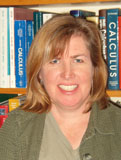Natasha Speer
Associate Professor of Mathematics Education
Faculty Member of the RiSE Center and Mathematics Education Research Group (MERG)
234 Neville Hall
207.581.3937
Email Natasha Speer
Recent Publications (also see below)
Education
- Ph.D. Mathematics, Science, and Technology, University of California at Berkeley, 2001
- M.A.T. Mathematics Education, Cornell University, 1990
- A.B. Mathematics, Cornell University. 1989
Bio
Natasha graduated in 1989 with a bachelor’s degree in mathematics, and in 1990 with a master’s degree in mathematics education from Cornell University in Ithaca, NY. In 2001, she received her Ph.D. in Education in Mathematics, Science, and Technology at the University of California at Berkeley. She has been a member of the Physics Education Research Laboratory since 2009.
Currently, she is working on video cases for novice college mathematics instructor professional development and the project “On The Job Learning: Graduate Student Instructors’ Development of Knowledge for Teaching,” which seeks to study newly formed teaching-related knowledge in novice college physics instructors.
Natasha is and has been teaching the courses Calculus I (MAT 126), Mathematics for Secondary School Teachers (MAT 305), Integrated Approaches in Mathematics Education I and II (SMT 505/506), as well as the Mathematics Teaching Assistant Teaching & Learning Seminar (MAT 500).
In her research, Natasha examines the influence that mathematical knowledge for teaching has on college mathematics instructors’ teaching practices.
Publications
Dorko, A. & Speer, N. (2015). Deepening Students’ Understanding of Area and Volume by Focusing on Units and Arrays, Journal of the California Mathematics Project, Vo. 7, 7-14.
Bragdon, D., Pandiscio, E., & Speer, N. (to appear, 2017). University Students’ Graph Interpretation and Comprehension Abilities, Investigations in Mathematics Learning.
Hauk, S., Speer, N. M., Kung, D., Tsay, J.-J., & Hsu, E. (Eds.) (2015). Video Cases for College Mathematics Instructor Professional Development.
Deshler, J., Hauk, S., & Speer, N. (June/July, 2015). Mathematics Graduate Students: Teaching Assistants (TAs) and Professional Development for Teaching in the U.S., Notices of the American Mathematics Society, 62(6), 638-643.
Dorko, A. & Speer, N. (2015). Calculus students’ understanding of area and volume units. Investigations in Mathematics Learning, 8(1), 23-46.
Speer, N., King, K. & Howell, H. (2014). Definitions of mathematical knowledge for teaching: Using these constructs in research on secondary and college mathematics teachers, Journal of Mathematics Teacher Education, 18(2), 105-122.
Dorko, A. & Speer, N. (2014). Calculus students’ understanding of volume. Investigations in Mathematics Learning, 6(2), 48-68.
Kung, D. & Speer, N. (2013). Do they really get it? Evaluating evidence of student understanding of power series, PRIMUS: Problems, Resources, and Issues in Mathematics Undergraduate Studies, 23:5, 419-433, DOI: 10.1080/10511970.2012.736122.

